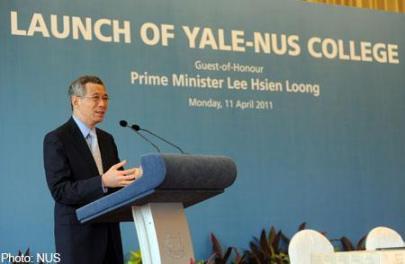
Image from asianist.wordpress.com
About 2 years ago, Yale University, in New Haven, CT, ‘climbed into bed’ (I quote Yale Daily News) with what many consider one of Southeast Asia’s most despotic authoritarian-democracy regimes, Singapore. The Ivy League college had partnered with the National University of Singapore to create Yale’s satellite campus and Singapore’s first liberal arts college (LAC), the Yale-NUS College, which is due to start classes in 2013. It is the largest overseas endeavor to bear Yale’s name. This move has put Yale in the spotlight of much criticism, debate and “flak”, as the TIME Magazine put it, namely on issues of human rights, and the ability to provide a true liberal arts education in the highly restricted city-state of Singapore, which has enjoyed one party rule for the last 50 years.
Liberal Arts is defined largely as an education model that teaches students to think critically, to ask questions, and that promotes values and skills about life and pertaining to the human condition. In the United States, many LACs are socially and politically liberal, with students being free to protesting, to expression, and to thought. LACs, traditionally, are free from any political / moral code, according to Time Magazine.
However, Yale has drawn criticism as Singapore is known for its harsh censorship laws, such as the ban on any political dissent, and the designation of one spot in the entire island for demonstrations to occur (but even then, one must register their protest with the government, and only citizens and permanent residents may take part). Coupled with Singapore’s history of rights violations, such as a penal code that persecutes members of the LGBTQ community, many accuse the Yale-NUS College for going against the fundamental civil and political liberalities one would expect in a true liberal arts education, as well as Yale’s motto as a “haven for free thought and expression”, as denoted by its motto ‘Lux et veritas’. As Phil Robertson, Human Rights Watch’s deputy director for Asia said, “Yale is betraying the spirit of the university as a center of open debate and protest by giving away the rights of its students at its new Singapore campus. Instead of defending these rights, Yale buckled when faced with Singapore’s draconian laws on demonstrations and policies restricting student groups.” Rather than fight authoritarian laws that run contrary to its beliefs, Yale, in this partnership to set up this college, is seen to have relented and acquiesced to the status quo of the country’s laws.
According to Percicles Lewis, the new President of the college, “Students at the new school “are going to be totally free to express their views,” but they would not be allowed to start / join any political groups (such as groups in the US that support the Democrats or the Republicans) on campus, nor participate in any banner wielding protests. While some claim that students are entitled to free thought in the classroom, with the cloud of self-censorship and discouragement of dissent that hangs over the regime, and I agree to a small extent that this is indeed a bold move for Singapore, I would venture to claim that it is highly unlikely that freedom of expression and true discussion could exist in a Yale-NUS Classroom. According to Yahoo News, in April, the Yale faculty voted 100 to 69 to pass a resolution expressing concern over Singapore’s “lack of respect for civil and political rights”. Too add one with what Heng Swee Keat, the Education Minister of Singapore expressed, “academic freedom and open inquiry…in a manner sensitive to the Singapore context.” To me, the condition of “in a manner sensitive to the Singapore context” reveals a political hold over freedom that I believe LACs should not have. To quote the Human Rights Watch, Yale’s move reveals a “disturbing disregard for free speech, association, and assembly”, and the prevent of the exercise of the fundamental rights of freedom, as I have mentioned earlier, runs counter to Yale’s mission. So far, I have some semblance of hope for the Yale-NUS College though, and will wait till next August to see how it fares.

